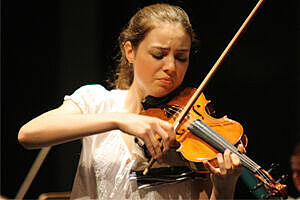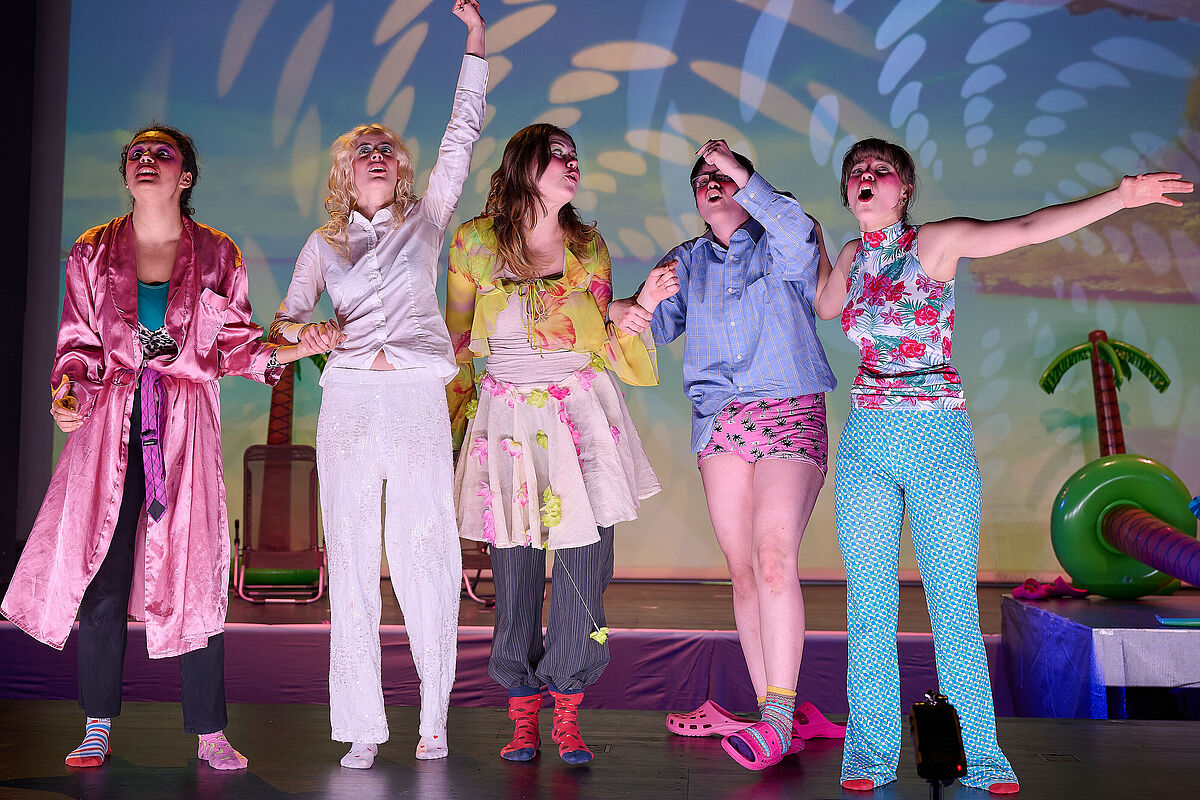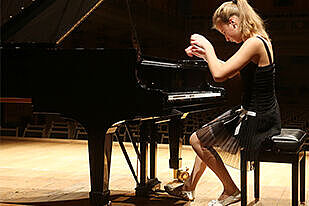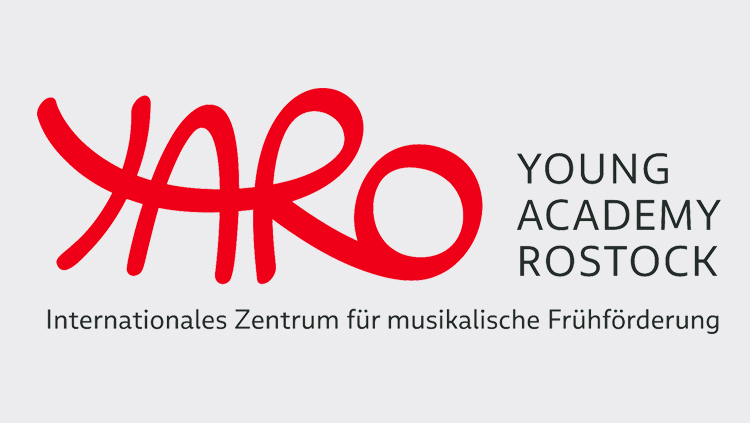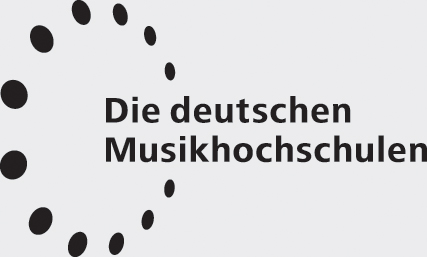Bachelor's Course Orchestra Conducting/Correpetition
Entrance Requirements
Applicants who wish to enrol at the University of Music and Theatre have to provide proof of entitlement (normally: “Abitur” – general/specialized higher education entrance qualification or foreign equivalent). As an exception for music studies and on request, this document might be complemented or replaced by a certificate verifying the passed entrance examination to the Hochschule für Musik und Theater Rostock. Applicants also need to have completed their compulsory education or will presumably have done so before they start their studies.
Course profile
- Official Length of the programme: four years, 240 ECTS-credits
- Start of the course: winter semester as well as summer semester
- Application period: 1 October to 15 November for the summer semester. 1 March to 15 April for the winter semester.
- University Degree: Bachelor of Music
- Teachers
Programme Details
The aim of the first major in orchestral conducting is to develop individual physical expression and to learn the technical skills that are helpful and necessary for conducting an orchestra. Lessons are usually held on pianos, but there are also regular sessions with the university orchestras and professional orchestras in the country. Examinations are currently taken with the university orchestra and students have the opportunity to conduct an opera and a concert.
The aim of the second main subject, accompaniment, is to learn the standard opera and operetta repertoire on the piano, which not only makes it much easier to study scores, but also enables students to work with singers and thus optimally prepares them for the most common career entry.
Making the orchestra audible on the piano, quickly grasping complex structures in prima vista playing, as well as the mutual artistic fertilisation of conducting and repetition should further enhance the knowledge and skills of the main subjects.
In addition, there are lessons in choral conducting, score playing, basso continuo, piano, improvisation and song composition. Chamber music as well as early and contemporary music are fields in which valuable conducting experience can also be gained.
Theoretical and scientific subjects are an essential part of the degree programme, which are indispensable for developing a sound and gaining knowledge through analysis.
In view of changes on the labour market, career planning and project management as well as health aspects and stress management must not be neglected. A particular advantage of our university is the strong communication structure between the institutes. This results in joint rehearsals or teaching situations which, in addition to the learning effect, strengthen the individual as a team.
The Bachelor’s course aims towards educating artists who are able to work as conductors in all professional fields that music theatres and concert halls offer. Due to the complexity of the profession, graduates have to possess artistic, teaching as well as social competence to master the challenge to work as a music director. The repertoire is immense as are the demands of the market. Therefore, the Bachelor’s course can only provide the basics for a professional career; several subjects can only be studied exemplarily – it has to be considered that students begin their studies without preparatory training.
The Master’s course in Orchestra Conducting will provide students with the final competence.
Foreign students whose native language is not German must provide evidence that their knowledge of German is sufficient for their chosen course.
For the Bachelor’s degree (Orchestra Conducting), students are required to have reached level C1 as defined by the Common European Framework of Reference for Languages.
Applicants’ linguistic competence will be established during the aptitude test.
You will find further information in the Aptitude Test Regulations and Matriculation Regulations (only in German) of Rostock University of Music and Drama.
Please note: There will be no aptitude test for the winter semester 2025/26.
Please apply via our application website by uploading the required documents and application videos by 15th of April for the following winter semester and 15th of November for the next following summer semester.
1st round : Online procedure
(ONE Video must be uploaded for each task )
Conducting task
J. Strauss: Die Fledermaus, Overture.
If possible, the piece should be conducted with two pianos. (A recording with orchestra is possible.) The applicants should be clearly visible from the front to allow observation of the number of pianos being played. Recordings without sound will not be considered.
Correpetition/Piano Excerpt Playing
C. M. v. Weber: Der Freischütz, Terzett Nr. 9 »Wie, was, Entsetzen«
The work is to be performed with vocal presentation (marking) of the vocal parts. Applicants must be recognisable by looking at the keyboard.
Piano
Candidates may select one piece from the following ones:
L. v. Beethoven: 1st Movement of the Sonata op. 2 Nr. 3, op. 10 Nr. 3, op. 22, op. 53, op. 57 or op. 81a
or
J. Brahms: Rhapsodie op. 79 Nr. 1
or
F. Chopin: Ballade g-moll op. 23
or
a work corresponding in difficulty to the preceding pieces.
Each video has to start with a short introduction (your name and your application number). The video has to be filmed in one take and live, which means the material must not be cut or post-edited. There is no need for professional video production. Videos taken with your mobile phone are absolutely fine.
You will receive an e-mail with the results of the 1st round of the entrance examination. If you have passed the 1st round, you will be invited to the 2nd round which will take place in June for the winter semester and in January for the summer semester. The exact dates will be published under apply for studies.
2nd round: Presence examination
The skill to proficiently communicate rehearsal content verbally is an important aspect of the examination assessment.
Conducting task
- W.A. Mozart: Don Giovanni, Nr. 23 Recitativo accompagnato »Crudele! Ah no, mio bene«
- J. Brahms: 1. Symphony in c, 4th movement
- C. Orff: Carmina Burana »Uf dem Anger« Nr. 6 Tanz
The presence examination usually takes place with piano(s). If possible, a singer will be available.
Correpetition/Piano Excerpt Playing
- Prepared: G. Puccini: La Bohème, Act III, Quartett from rehearsal number 24. The work is to be performed with vocal presentation (marking) of the vocal parts.
- Prima Vista performance from from musical theatre or/and choral symphonic works, as well as a short section of a score. Candidates should demonstrate their ability to present the essential content of the work excerpts presented to them in a musically meaningful way on the piano.
If you pass the on-campus examination, you will then be tested in the compulsory subjects Piano and Music theory. There is also a language test for foreign applicants.
Piano: Play - preferably by heart - 4 piano works from different stylistic periods with a higher level of difficulty.
We look forward to receiving your application!
Application
Click here for the ONLINE APPLICATION and the dates of the APTITUDE TEST.
A fee of 50 Euro is charged for processing your application for admission. Please transfer this amount when you submit your application.
We will gladly advise you personally!
Mrs Dörtje Peters
Study Office for Music
fon +49 381 5108 220
fax +49 381 5108 201
doertje.peters@hmt-rostock.de
Studium generale:
Dr Janette Kranz
University of Rostock
Student Counselling Service of the Faculty of Philosophy
August-Bebel-Str. 28 | R9022
phone +49 381 498 2010
janette.kranz@uni-rostock.de
Head of Conducting: Florian Erdl
florian.erdlhmt-rostockde
Please visit our University Information Day in April!
Back to DEGREE COURSES

